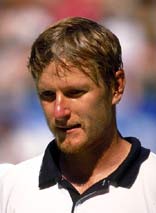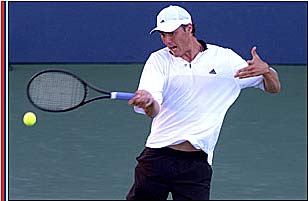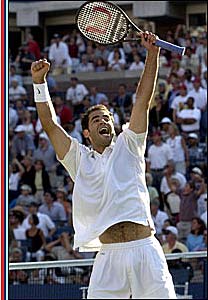<% ns_puts [mkm_getnavbar] %>
Prognosticator's Peril and Pleasure
Hewitt versus Kafelnikov
O.K., after all these years I should have known better than to
prognosticate. I try to assess the situation as best I can to arrive at an
educated prediction regarding the outcome of a match. In most cases you'll
 probably
have noticed that an escape hatch is built into a pre-match analysis and
even in the case of the Kafelnikov fiasco I did state that Hewitt could
win if certain conditions are met. Unfortunately I didn't consider the
peril of a scenario in which Kafelnikov would play his worst tennis of the
year, barely put up a fight, and have an intensity level of someone who
just got out of bed. I, and probably Hewitt as well, at least expected a
competitive match.
probably
have noticed that an escape hatch is built into a pre-match analysis and
even in the case of the Kafelnikov fiasco I did state that Hewitt could
win if certain conditions are met. Unfortunately I didn't consider the
peril of a scenario in which Kafelnikov would play his worst tennis of the
year, barely put up a fight, and have an intensity level of someone who
just got out of bed. I, and probably Hewitt as well, at least expected a
competitive match.
|
Hewitt certainly didn't expect to be off the court in well under two hours. Now comes the explaining. First it was interesting to hear that Kafelnikov does not have coach at the moment. Could a coach have better prepared him for this match? He obviously did well against Kuerten and for the whole tournament without a coach. Who knows? I think a coach could have helped immensely, better yet, a coach-sport psychologist combination. If you've read my previous articles and my protocol for psychological preparation you know where I stand on this.
In the case of Kafelnikov's dive, a larger and more global issue surfaces, namely, the general unprofessional nature of player-coach-training dynamics in professional tennis. It would be unheard of for a team or player in other sports to go into a major event or even routine game, match, or competition without systematic preparation on all fronts
Most athletes, and even some of the more professional tennis players have the support of an infrastructure consisting of physical trainers, coaches, nutritionists, statisticians, and in some cases sport psychologists. Obviously, professional tennis players in most cases do not have the resources to finance a huge support group. Nevertheless, we expect a multimillionaire like Kafelnikov to spare no expense in making sure he is mentally and physically prepared for a Grand Slam semifinal. He owes that to the game.
I do not buy his post-match musings that Hewitt was playing on such a high level that he didn't have a chance. That's bunk. Hewitt wasn't even tested. It was patently obvious Kafelnikov was not prepared. That is something one cannot forecast as an analyst.
|
At any rate, the new generation of tennis players must be exposed to cutting edge research and intervention methods in sport and performance psychology and see to it (or have their coaches and agents see to it) that they are applied consistently, especially before major occasions. Tennis needs all the help it can get. It's matches like today's that turn people off. Professional preparation is the key to insuring big matches bring out the best in players.
Sampras versus Safin
Sampras continues to make his run toward the title. His performance is a pleasure to watch and remains consistent with my thesis that significant emotional memories coupled with an enhanced motivational state goes a long way toward firing up a dormant motor system. In contrast to his compatriot, Safin put up a good fight and with a break (literally and figuratively) here or there might have been able to extend Pete to a 4th and perhaps even 5th set.
Safin couldn't benefit to the extent Sampras did from memories of previous US Open occasions (his win last year) once it became apparent Pete was in control. The matche's progression soon erased visions Safin may have had of his dominating performance last year. Once the reality of the present conflicts with memories of the past disruptive thoughts can occur, like "well I've lost the first set, Pete's playing good, what am I going to do now!?"
When such doubts surface it's easy to lose a step or two, making one feel further removed than ever from that magical Zone once experienced in the past.
Sampras on the other hand was fully in control of his physical and mental game and despite an upset stomach hung in there during the few precarious moments he experienced. Certainly he wasn't going to let a minor gut ache get in the way of his quest, especially after his ordeal against Corretja in which he was much worse off and still won. Sampras has called on all his past experiences to put together an incredible fortnight. He has aptly demonstrated that good mental preparation can rejuvenate a tired game, something Kafelnikov has to learn.
|
In Sampras' case I am not talking about a guy who consciously sets out to pump himself up. In fact, on occasions, he has scoffed at the idea of using a Sport Psychologist and has even asked Agassi what Brad Gilbert really does for him (Andre). Meaning, Sampras is very much a traditionalist who believes more in on court work than fast talking analysts like Gilbert. His suck-it-up attitude is often typical of macho athletes. On one hand this sort of repressive behavior can facilitate performance by blocking out self-doubt. However, on the other hand, failing to admit one is having a tennis problem can do a number on your psychophysiology to the point of experiencing a "tennis depression" marked by a lack of motivation we have seen in Pete for most of the last 12 months.
At this year's US Open, Pete's subconscious has finally exerted it's positive influence to pump up Pete without overt prompting, although I would venture to speculate that all of the hype surrounding his tennis funk indeed functioned as wake-up call or kick in the butt. Considering that Sampras wants to play 4-6 more years, I hope that he will become more open to using psychological techniques to manipulate his psyche so that he'll have fun and perform on a level like at this year's Open more often.
Your comments are welcome. Let us know what you about think this article by emailing us here at TennisONE.
Dr. Roland A. Carlstedt has followed the professional
tennis tours since 1985, fulltime from 1989-1998 in which he on average
attended 25 tournaments a year including all Grand Slam events and
important Davis Cup ties. During this time he complied perhaps the most
extensive database in existence on the psychological performance,
tendencies, and profiles of most ATP and WTA players. His annual
Psychological World Rankings for Tennis have been published since 1991
more than 500 times in over 40 countries. His rankings and data are based
on his Psychological Observation System for Tennis. Interestingly his 2000
rankings which were released prior to the 2001 Australian Open had 2 of 4
semifinalists and 8 of 16 quarterfinalists on them including such unlikely
players as Arnaud Clement and Sebastian Grossjean. His 2001 rankings will
appear in TennisONE at the end of the year.
Last Updated 9/7/01. To contact us, please email to: webmaster@tennisone.com
TennisONE is a registered trademark of TennisONE and SportsWeb ONE; Copyright 1995. All rights reserved.



